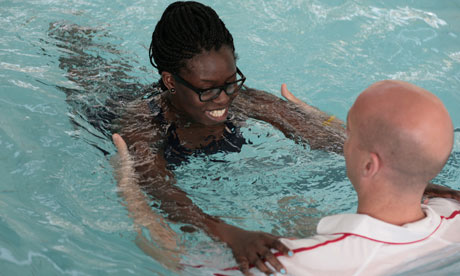
I am not well equipped with the life skills that most people have mastered by the time they hit adulthood. I cannot ride a bicycle – despite "learning" to do so two years ago. I cannot drive (I had three lessons and was too terrified to get back in the driver's seat again). Last, and to my mind most worryingly, I cannot swim. If the dystopian future of Kevin Costner's film Waterworld ever comes to pass, I'll be toast.
Swimming is a statutory requirement of the school curriculum for children aged seven to 11, but a report released last month by the Amateur Swimming Association (ASA) said that 200,000 children will leave primary school unable to swim – and 40% of those children have never been offered lessons. The research also showed that one in six parents never take their child swimming, reducing their chance of learning even further. There were more than 400 drownings in the UK in 2010, and The Royal Society of Prevention of Accidents says that it is a "leading cause" of accidental death in the UK.
For me, the realisation that I had to learn dawned while I was on holiday in Cuba with a friend. We visited Cueva de Saturno, an underground swimming cave in Varadero, and, unable to participate, I hung back awkwardly in the shallows. At 29, my time had come.
Back in London at Golden Lane Sport and Fitness – the only public pool in the Square Mile – I meet instructor and centre manager Jonathan Acott. "What's your swimming experience," he asks. I tell him that I sink like a stone. There's a brief pause before he replies: "I'm going to have to get in the water then."
I have had a lot of time to consider the reasons I haven't learned to swim and it is down to two things: I was never encouraged to; and, perhaps unsurprisingly, I am scared of the water. Jonathan gets in first, and directs me to do the same – down three rungs, with my back to the pool. He explains the slope of the pool floor: we will go no further than the black line that he points out, and the water will be no higher than my chin. As we walk the breadth of the pool, I grip the side for support. At worst, he says, I could lose my footing – but he will catch me. I am pathetically reassured to hear this.
We carry on walking and I adjust to the flow of the water. Also in the pool are a handful of over-60s, who have graciously allowed me to take up a corner during their designated hour. I soon move on to holding Jonathan's shoulders, letting my body float up behind me. It is terrifying, and I tense up. But Jonathan is relaxed and eventually I start to relax too. He has been teaching for almost a decade, and says he prefers to teach adults. His oldest pupil was a man in his late 70s. "The beauty of teaching adults is that there is no formula, because everyone has their own challenges. I find it more rewarding," he says.
Has he found a recurring theme in late learners? "Fear of the unknown," he says. When I ask fellow non-swimmers about their hang-ups, almost all admit to a phobia of water. Jonathan, who has twice had cancer, likens this fear to the unknowns of chemotherapy: "I didn't know what it was, and no one had actually explained the mechanics, so I built myself into a frenzy about it. I eventually had it, and it's not pleasant, but I understood what it was."
Author and artist Leanne Shapton is someone who understands swimming on an instinctive level. Her new memoir, Swimming Studies, revisits her teenage years as a competitive swimmer, when she got as far as the Olympic trials. It begins: "Water is elemental, it's what we're made of, what we can't live within or without." Shapton's story is the opposite of mine: her parents first took her swimming aged two. "I can imagine how hard it would be," she tells me from New York. "I've never had fear [in the water]. I feel more comfortable there than I do on land."
These days she no longer competes: "I didn't like training – the competitive drive was there, but it didn't make me feel good," she says. "[As a teenager] I had a love of the sport in a slightly different way. It was a little removed, somehow." But she still swims now "wherever there's a pool".
So, how many lessons before I am gliding through the water like an eel? Jonathan is gently cautious. "You are not going to be swimming in three lessons, I'll tell you now," he says. "And I am sceptical of anyone who says they can teach that. There are so many variables – how quickly your body adapts, how physically coordinated you are, the level of fear you have, your flexibility."
But, he assures me, it is never too late too learn.
• Golden Lane's swim school offers one-to-one lessons: 020 7250 1464. Leanne Shapton's Swimming Studies will be published by Particular Books on 26 July.

